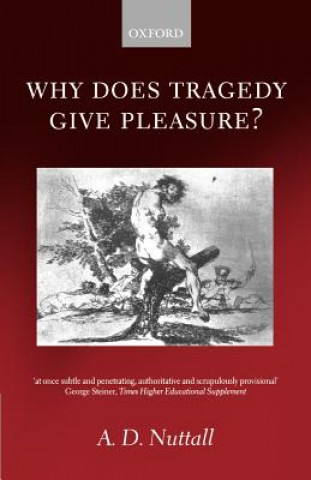
Dostava
Savjetnik za kupnju





Proizvod vam ne odgovara? Nema veze! Možete nam vratiti unutar 30 dana
 Poklon bon
u bilo kojoj vrijednosti
Poklon bon
u bilo kojoj vrijednosti
S poklon bonom ne možete pogriješiti. Za poklon bon primatelj može odabrati bilo što iz naše ponude.
Why Does Tragedy Give Pleasure?
 Engleski
Engleski
 194 b
194 b
30 dana za povrat kupljenih proizvoda
Moglo bi vas zanimati i


Why does tragedy give pleasure? Why do people who are neither wicked nor depraved enjoy watching plays about suffering or death? Is it because we see horrific matter controlled by majestic art? Or because tragedy actually reaches out to the dark side of human nature? A. D. Nuttall's wide-ranging, lively and engaging book offers a new answer to this perennial question. The 'classical' answer to the question is rooted in Aristotle and rests on the unreality of the tragic presentation: no one really dies; we are free to enjoy watching potentially horrible events controlled and disposed in majestic sequence by art. In the nineteenth century, Nietzsche dared to suggest that Greek tragedy is involved with darkness and unreason and Freud asserted that we are all, at the unconscious level, quite wicked enough to rejoice in death. But the problem persists: how can the conscious mind assent to such enjoyment? Strenuous bodily exercise is pleasurable. Could we, when we respond to a tragedy, be exercising our emotions, preparing for real grief and fear? King Lear actually destroys an expected majestic sequence. Might the pleasure of tragedy have more to do with possible truth than with 'splendid evasion'?
Informacije o knjizi
 Engleski
Engleski




 Kako kupovati
Kako kupovati


























